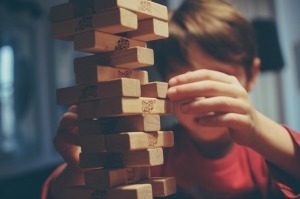I have often been a listening ear to a mother of a son who has ADD. What follows is his story, in this mother’s own words.
The Diagnosis
Something was wrong with my son. Someone I don’t like and don’t respect for a multitude of reasons basically twisted our arms into taking him to a specialist. He was finally diagnosed with ADD. There are three main “flavors” of ADD/ADHD – hyperactive, inattentive, and impulsive. Some people have one or the other, some people have a mixed diagnosis, and sometimes each flavor looks like the others. Sometimes ADD/ADHD is also mixed with more serious disorders. My son is inattentive. Thus, he struggles with us and his school teachers. Few others can see his challenges. I’m grateful he isn’t hyperactive since the entire world struggles with and doesn’t understand hyperactive people—especially children.
I was in denial, and it took me a little bit to accept the diagnosis. It was hard for me to see my beautiful, kind, athletic, handsome, and smart son as anything less than the “perfect” child I had always hoped for. I looked at him and felt he had more natural gifts than I ever had, and I saw a bright future. However, as we continued to struggle with getting things done—with homework and sometimes chapter test scores that didn’t reflect what was in his brain, I knew there was something wrong. However, I didn’t think ADD. I thought he was lazy or “too” gifted. I thought he just didn’t know how to work for something.
What bothered me is that there is no scientific test for ADD/ADHD—no blood, urine, or fecal sample. No brain scan typically. It is a diagnosis based on the observation of the parents and teachers in his life. We fill out a questionnaire, the questionnaires are scored, and the diagnosis is estimated. I could easily see how an adult’s experience with other children could drastically tweak the diagnosis. It didn’t seem like real science to me.
When Things Finally Started Making Sense
What finally “clicked” for me were a couple of things:
-
- The school director said that taking the ADD medication would immediately tell us if he was ADD. If it worked, the diagnosis was correct. If it didn’t work, then the diagnosis was incorrect. Lastly, if it helped partially, the diagnosis wasn’t complete. This seemed logical to me.
-
- I spent the day in my son’s classroom. The teacher said it was the best he had performed in weeks, because he obviously wanted to impress me. However, I could still see how much he was struggling to focus even when he wanted to do his best. I took a break and left campus to get some lunch. I sat in a restaurant, called my Mom, and cried my eyes out in public. He was so happy to have me there, but I could also see him struggle to focus.
-
- His teacher shared a classroom with his previous teacher. She said she listened to his previous teacher all year asking my son to focus, again and again and again.
-
- Our HMO is known to have a weakness in handling learning disabilities and mental health. So, I took him to the leading specialist in the region to get a second opinion. I finally felt like someone listened to me, and I could get educated answers based on his many years of experience. He told me that my son was taking far less medication than recommended, and that even at a full level there was no risk of addiction.
-
- I remembered that even as a toddler, I used to put my hands on both sides of his face, and turn his eyes to look into mine in order to get his attention. In fact, when I’m distracted and he wants my attention away from my computer, he sometimes does the same to me. When I remembered this, it was like “Ah ha! Nothing I did, or fed him, or said to him caused this.” I still remind myself of this when I need to cope with “Mommy guilt.”
-
- The learning doctor asked him to remember three simple things. Then she talked to him for a few minutes. Then she asked him to tell her what those three things were, and he couldn’t remember. Lights went off again in my head. He can’t remember to do three instructions around the house. My other child can. Other children I have met can remember three things. Often my son can’t. He struggles with papers, tests, and reports that ask “What three things was Teddy Roosevelt known for? What were the three reasons that the pilgrims came to the Americas? Name the three ….” Multiple choice, true or false, he can ace it. Remembering a set of things, however, puts him at a disadvantage.
-
- I finally realized that it wasn’t about me. It wasn’t about my hopes and dreams or my own pride. This was about my son. It was about providing him every tool he needed in order to succeed; it was about giving him a way out of the mental prison he was in. This was about helping him, and it wasn’t about the world thinking I’m a horrible parent.
It’s Not Just “Boredom”
My son’s ADD isn’t about the normal boredom that we all experience, and it isn’t his laziness or our bad parenting. As it was described in one of the many classes we’ve taken, his mind is literally operating at two different speeds and both are seemingly out of sync with the rest of the world. The medication puts his mind in sync.
He can also be hyper-focused on something he really wants weeks from now. For instance, buying a new video game or a friend’s party or a field trip or getting Mom to take him to Target on Saturday will consume his thoughts for weeks. Because of this, we try to avoid telling him about some things in order to ease his distraction levels.
He also has some aspects of impulsiveness. Most kids will stop talking when they are in trouble with Mom and Dad—MOST kids. No matter how much trouble he’s in—if he’s thinking it, it comes out of his mouth. There is no editor. So, he just digs himself into a deeper and deeper hole. We are working on this one as well. We are working on our patience and his ability to be a self-editor.
He’s stubborn naturally—but when the ADD is winning, he’s illogically stubborn and abnormally self-absorbed. Thirty minutes after taking his medication, he’s the sweetest, most caring and helpful kid you’ve ever met. He’s the son I know and love.
ADD Medication
The ADD medication can stunt a child’s growth and reduce their appetite, so most parents try to administer the medication only when needed for school. His medication gets him through the school day, but is pretty much worn off by the time he has to do homework. He has to personally fight with himself to complete one assignment each night (and this really manifests as fighting with everyone in the family). And if his teacher has criticized or berated him, making him feel hopeless, or his set of assignments grows too large, also making him feel hopeless—you can forget it. Panic sets in. He has a meltdown because he doesn’t see a way out—like college-level meltdowns my friends and I used to have.
As you can imagine, we don’t skip school for vacations, and I schedule doctor’s appointments as close to the end of the day as possible, as putting him behind in schoolwork just isn’t an option. I’ve been working with him on coping through these near-panic situations. He personally prevented himself from panicking and worked his way out of a hopeless situation recently. I was really happy about it; I counted that as a win in my book.
September through October, when the school year is just starting, he does pretty well. But then tiredness sets in and the rest of the year is a struggle. Having Christmas breaks doesn’t help. He basically operates at less than optimal when it gets to be mid-November through the end of January, impacting two out of four academic quarters. There are times during the summer or holidays when a pill is needed just for family sanity, and I think there is no shame in this if it keeps peace in your home. When he’s playing sports, we can’t see any clear evidence that taking his medication helps or hurts his game play.
Practicing Patience: Thank You
Teachers, thank you for not giving up on these kids. Just remember when you’re struggling with a child like my son that the parents get the child AFTER work (when both parent and child are tired) WITHOUT any medication.
However, we could still see that something else wasn’t quite right. My Mommy radar was still sending off alarms. I’ll explain more in Part II.
About Tudie Rose
Tudie Rose is a mother of four and grandmother of ten in Sacramento, California. You can find her on Twitter as @TudieRose. She blogs as Tudie Rose at http://potrackrose.wordpress.com. She has written articles for Familius. You will find a Tudie Rose essay in Lessons from My Parents, Michele Robbins, Familius 2013, at http://www.familius.com/lessons-from-my-parents.
Twitter •






Thanks for sharing this. My daughter has ADD also. At first we just thought “she’s a girl, she’s just a little ditzy” she really had the impulsive part. She wasn’t ever afraid of anything. Which of course scared us to death.
We have 2 sons older than her. Also 1 son that’s 2 years younger.
I am so grateful for her 2nd grade teacher. It was so hard at night. She would have a math paper with approximately 12 problems. It would take 2+ hours to finish it. With my sweet husband right by her side the whole time.
She would finally finish and we would have her bring her homework folder to the table. So we could initial that she had done it. Then slide it right in the folder. She was supposed to take the folder out of her backpack at the beginning of the school day. Place it on the teachers desk, with all the other folders. There were many times that she wouldn’t even turn the folder in. Of course that meant her homework wasn’t turned in many times. When we would call her attention to it, asking her why she didn’t turn it in. She would shrug her shoulders, as if it was ok. It didn’t matter that much.
My husband explained to her that doing all that work and not turning it in. Would be the same thing as him going to work all week, then leaving his check at work.
I also tried letting her play for an hour after school before dinner. So she could work on her homework after dinner. But it was still the same story.
My son had the same teacher 2 years before. So I knew her well as I was the room mother. I also came in for an hour every Friday morning to help the children with their reading.
Approximately 6 weeks into the year, when school was over. I was just helping this wonderful teacher cleaning up a little. The only ones still in the room were the teacher and .I. IShe said “I am not supposed to tell you what I am about to tell you. But I feel so strongly that I need too.” I nodded for her to go ahead. She said “I think your daughter has ADD, have you ever asked her doctor about it? Do you see the same things at home that I see here?”
I asked her what she saw specifically so I would know. She then told us that just that day she had been at the chalkboard explaining a different way to solve a math problem. While she was doing that my daughter got up from her desk and walked over to the backpacks, she was just like looking at them. But clearly wasn’t thinking, listening, or trying to learn what the teacher was teaching them.
I knew exactly what she meant. I told her it was the same at home. She suggested that I call her doctor and let him know what was happening, and see what he said. I gave her a big hug and thanked her for telling me.
I called him when I arrived home and explained everything. He told me to do the 3 things test right while he was on the phone and see what she did.
So I asked her to pick up a book, take it to her room, then put it on the bed.
I walked behind her far enough that she wouldn’t wonder why I was following her. But close enough to see what she would do. She made it to her bedroom. Then she sat on the floor with the book in her hands.
She started to cry. I asked her what was wrong and she replied very quietly “I don’t know what I am supposed to do next.”
We met with doctor the very next morning. He did more tests with her to see how she did. After consulting with the doctor and learning more about it. He knew right away she had it. She loved that doctor. She had epilepsy, but had out grown it a year before. Because of that she had spent a lot of time there. Many blood draws, adjusting medications etc. he realized right away that she did have ADD.
She has been on the same medication since 5th grade. She turned 23 this week. It is such a blessing to see her act/focus/understand the same as everyone else. The sweetest thing happened when she took this medication the first time. About an hour after taking it, she said “Mom is this how everyone else feels all the time? I am so happy to be like everyone.”
We saw the change immediately and she has been so much happier and her self confidence grew so much.
You can tell when it has worn off at night, but it doesn’t wear off until about 9-10 at night.
She was able to go on an LDS Mission and did great there.
Sorry for this long message but as I read this, I was taken back to the beginning for us. I will always be so grateful that her teacher wasn’t afraid to tell me what she thought.
Thanks again. I look forward to reading the next part of your journey.
Thank you for sharing your own story! It inspires us to hear about wonderful people like your daughter’s teacher who love children and do all they can to help them. We’re grateful to have readers like you who share their own experiences and strengthen the rest of us. Thank you!